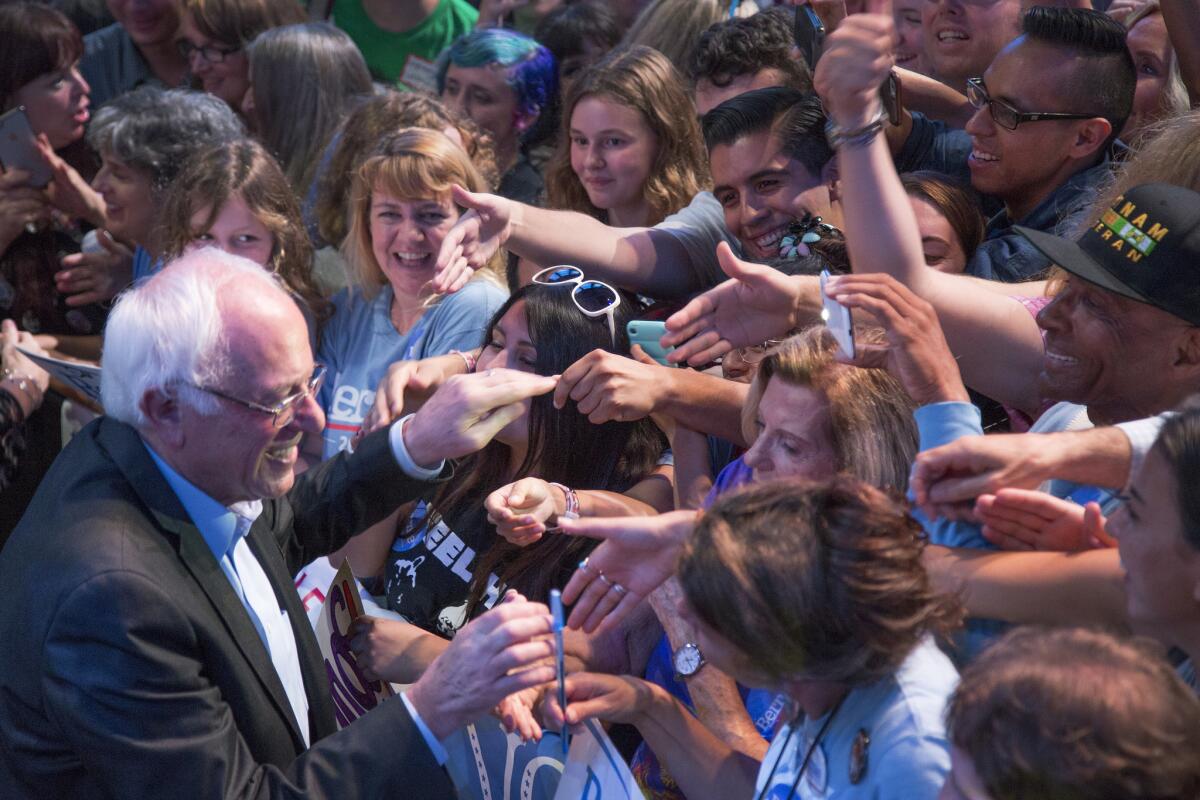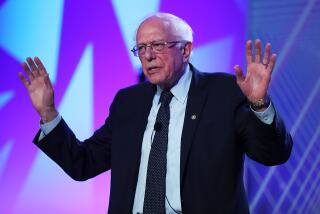Column: Bernie Sanders has some explaining to do

Democratic presidential candidate Bernie Sanders greets supporters at a campaign fundraising reception at the Avalon Hollywood nightclub on Oct. 14.
Bernie Sanders, the insurgent candidate for president, says he plans to give “a major speech” soon explaining what he means when he calls himself a democratic socialist.
“I think there are a lot of people who, when they hear the word ‘socialist,’ get very, very nervous,” Sanders told reporters in Iowa this week. He’s right; a recent Gallup Poll found that 50% of voters aren’t willing to vote for a socialist.
But it’s a little puzzling why Sanders thinks he needs to give a stemwinder on the subject. He’s been explaining his definition of socialism almost nonstop since he declared his candidacy in April.
“To me, democratic socialism means democracy,” he said in Iowa. “It means creating a government that represents all of us, not just the wealthiest people in the country.” (That’s the Ben & Jerry’s version.)
“There are socialist programs out there that are some of the most popular programs in America,” he said, citing Social Security and Medicare. “When you go to your public library, when you call your fire department or the police department, what do you think you’re calling?” (The New Deal version.)
“What democratic socialism is about is saying that it is immoral and wrong that the top one-tenth of 1% in this country … own almost as much wealth as the bottom 90%,” he said at the Democrats’ debate last week. (The Occupy Wall Street version.)
What he needs to do now is describe how his ambitious, big-government proposals would work.
Actually, none of those captures what “democratic socialism” means — at least, what it meant half a century ago, when Sanders joined a socialist youth group at the University of Chicago. Back then, socialism was a muscular creed that sought to put workers in control of the economy, often by nationalizing major industries like energy, automobiles and steel.
But Sanders is running for the presidential nomination of the Democratic Party, not the Socialist Party. He’s watered down the faith of his youth to make it more palatable to most Americans — and that’s fine.
He’s turned into a “social democrat” much like the technocrats he praises in Denmark and Sweden. To purists on the left, that makes Sanders a SINO — a socialist in name only. But he’s winning millions of converts and widening the Democrats’ window of debate toward the left, which is more than old-school socialists have accomplished since about 1972.
But giving explanatory speeches will only take Sanders so far. What he needs to do now is describe how his ambitious, big-government proposals would work, whether you choose to call them progressive, socialist or anything else. He hasn’t done much of that, even though he’s been running for six months.
Take his biggest, boldest idea: Medicare for all. Sanders says he wants everyone enrolled in one big government-run health insurance system. No more private insurance plans, no more Obamacare, no more Medicaid. At least, that’s what I think he means; he hasn’t provided any details.
“I wish I had more answers for you,” his policy director, Warren Gunnels, told me this week. “He hasn’t decided on the exact form it should take — other than being universal, single-payer, Medicare for all.”
That also means it’s impossible to estimate how much the plan would cost. One expert outside Sanders’ campaign calculated $9.6 trillion over 10 years; another, $17.6 trillion — a big range. Either way, Gunnels said, the plan would end up saving Americans money because they wouldn’t have to pay for private insurance, and because it would be more efficient than our current profit-based crazy quilt.
I happen to think he’s right because most advanced European countries (not just Denmark) have single-payer systems that work as well as ours, at much lower cost. But without more details, no one can really say.
Or take a second pillar of Sanders’ platform: making the wealthy pay more to support collective (oops, I mean democratic) efforts. Sanders has made it clear that he would raise the top income tax rate. “It will be a damned lot higher than it is right now,” he said this week.
But how much, exactly, is a damned lot?
Gunnels sighed. “We will be releasing a comprehensive tax proposal soon, and we’ll let you know,” he said.
In 2008, then-candidates Barack Obama and Hillary Rodham Clinton both promised they wouldn’t raise taxes on the middle class, which they defined as couples making $250,000 or less. How about Sanders?
“He hasn’t ruled it out; he hasn’t ruled it in,” Gunnels said.
Finally, Sanders’ big ambitions raise an important question: Does he have any ideas for making sure the federal bureaucracy can administer new programs well? Can he convince Americans who are skeptical of big government that, this time, Washington can get it right?
Bernie Sanders deserves to be taken seriously as a potential presidential nominee, and voters deserve more detailed information about his proposals for expanded federal programs.
That’s what Sanders needs to be talking about — even though it’s a lot tougher than defining democratic socialism.
Twitter: @DoyleMcManus
Follow the Opinion section on Twitter @latimesopinion and Facebook.
MORE FROM OPINION:
What ‘Back to the Future’ didn’t predict: Neighborhoods off-limits to the middle class
Flashback to 2008: When Hillary Rodham Clinton wooed Christian conservatives
Congress to try again on gun control
More to Read
A cure for the common opinion
Get thought-provoking perspectives with our weekly newsletter.
You may occasionally receive promotional content from the Los Angeles Times.











